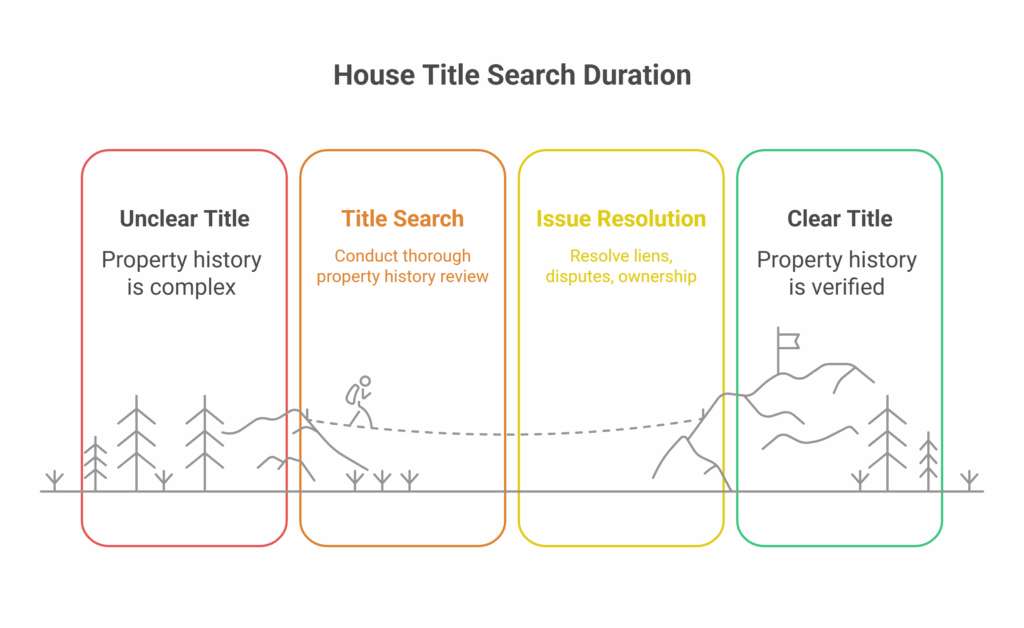Quick Answer: How Long Does a Title Search Take on a House?
If you’re wondering “How Long Does a Title Search Take on a House?” the short answer is usually anywhere between a few days to about two weeks. The timeline depends on the complexity of the property’s records and how quickly the county or title company can access them. For a straightforward property with clear ownership and no disputes, the process can be completed in just a few business days. However, if there are liens, unresolved debts, or multiple transfers in its history, it may stretch out longer.
Since the title search is a critical step in protecting buyers from hidden legal issues, it’s worth the wait—even if it feels like watching paint dry, only with more paperwork involved.
Now let’s dive deeper.

What Is a Title Search?
A title search is a detailed examination of public records related to a property. The purpose is to verify the legal ownership and discover any claims, liens, or encumbrances on the home. This includes looking into:
- Previous ownership records
- Mortgage information
- Property taxes and unpaid utilities
- Legal judgments and liens
- Easements or restrictions on the land
The ultimate goal is to ensure that the title is “clear” — free from any legal issues — so that the buyer can take full, undisputed ownership of the property.
Why Is a Title Search Important?
A title search protects both the buyer and the lender from potential legal and financial problems. Imagine purchasing a home, only to later discover that a long-lost relative of a previous owner has a claim to the property. Or worse, a lien for unpaid contractor bills suddenly surfaces. Without a thorough title search, these issues could become your problem.
That’s why lenders typically require title insurance, which is only issued after a comprehensive title search. Even if you’re buying with cash and not using a lender, it’s still a smart move to conduct a title search to avoid future complications.
How Long Does a Title Search Take?
In most cases, a title search takes between 3 to 10 business days. However, this timeframe can vary depending on several factors:
1. Location of the Property
Some counties or states have digitized and easily accessible records, allowing title companies to conduct searches quickly. Others rely on manual records or have backlogs that can slow down the process.
2. Age and History of the Property
If the property is relatively new or has had few owners, the title search can be completed faster. In contrast, an older property with a long or complicated ownership history may take longer to investigate.
3. Title Company or Attorney Efficiency
The speed of the title search also depends on how quickly the title company or real estate attorney can access and review the necessary documents.
4. Volume of Real Estate Transactions
During times of high market activity, such as the spring and summer months, title companies may be overwhelmed with requests, causing delays.
What Happens If Issues Are Found?
If the title search uncovers problems—commonly referred to as “clouds” on the title—those must be resolved before the closing can proceed. Common issues include:
- Unpaid property taxes
- Mechanic’s liens (from contractors)
- Judgments from lawsuits
- Unreleased mortgages
- Clerical errors in past records
Depending on the nature of the issue, clearing the title could take a few extra days to several weeks. In rare cases, it may even derail the transaction altogether.
Can a Title Search Be Expedited?
Yes, in some cases, you can expedite a title search by working with an experienced title company or attorney who offers rush services. However, this may come with an additional fee. If you’re working under a tight closing deadline, let your real estate agent and title company know as early as possible to avoid delays.
Title Search and Closing Timeline
The title search is typically one of the first steps after the purchase agreement is signed. Here’s a rough breakdown of a typical closing timeline:
- Day 1–5: Title search begins
- Day 5–10: Title search completed and title commitment issued
- Day 10–30: Any issues resolved; closing documents prepared
- Day 30–45: Final closing and property transferred
Of course, if any problems arise, this timeline can shift. That’s why it’s crucial to stay in communication with your real estate team and title professionals throughout the process.
Final Thoughts
Buying a home is one of the most significant investments you’ll ever make, and ensuring that the title is clear is a major step in protecting that investment. While a title search typically takes less than two weeks, factors like property history, location, and workload can influence the duration.
If you’re planning to purchase property in Texas or are in the middle of the closing process, understanding how long a title search takes can help you plan better and avoid surprises. Whether you’re a first-time homebuyer or seasoned investor, it’s always smart to work with professionals who know the local market inside and out. If you’re looking for guidance from experienced house buyers in Texas, we’re here to help.
